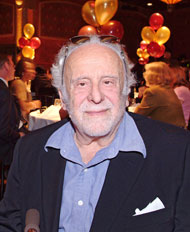Genocide definition is crucial: Jonassohn
Sociologist delivers inaugural lecture to celebrate anniversary of department

Kurt Jonassohn was the inaugural speaker in a lecture series sponsored by the Department of Sociology and Anthropology. Above, he enjoys the dinner celebrating the department’s 40th anniversary on Oct. 8.
Photo by Kate Hutchinson
“We are in the presence of a crime without a name.” That was how Sir Winston Churchill responded in 1941 when he learned of the mass killings in the Axis countries.
He was right, according to sociologist Kurt Jonassohn. The word genocide didn’t enter the English lexicon until after World War II.
In the ealry ‘80s, Jonassohn and History professor Frank Chalk started to teach what they say remains the only year-long university course on genocide.
Now retired, Joanasshon returned to Concordia on Oct. 7 to deliver the Department of Sociology and Anthropology’s inaugural Hubert Guindon Memorial Lecture, “The Comparative Study of Genocides,” in the DeSève Cinema.
He said three factors are crucial to prevent genocide: respect for the rule of law, a somewhat equal distribution of wealth, and grassroots democracy, the latter, in practice as well as in theory.
“The greater the gap between the haves and have-nots, the more likely it is the society will engage in massacres or genocides,” he said.
Since it became a subject of scholarly study, two kinds of genocide have been identified, utilitarian and ideological.
Those who carry out utilitarian genocide do so for some tangible purpose, such as to annex land. The price or stigma exacted on a society that commits ideological genocide, which aims to implement a theory or program, as in the case of the Holocaust, is usually much higher, and can last for generations.
Perhaps the most delicate part of his work has been composing a useful definition of genocide. The one used in the UN Convention on Genocide isn’t suitable for academic purposes, Jonassohn said, because bureaucrats have stripped it of any real meaning.
While debate and “sophistry” about definitions are commonplace in academia, he has little tolerance for those who tinker with them for personal gain.
“Definitions are tools you use in research, not toys you shape to your own preferences,” he said. “Genocide is a bad thing, so it [becomes] a label to describe other things we also disapprove of.” As an example, he referred to those who refer to family planning as genocide of the family, “which, of course, is utter nonsense.”
While most definitions of genocide focus on the victim, Jonassohn and Chalk, wrote one that mentions those who commit it.
“We have huge volumes on studies of victims and literature even on the bystanders, but we have very little literature on the perpetrators,” Jonassohn said.
He finds this oversight perplexing because “we will never fully understand genocide until we shine our lights on the perpetrators and what led them to it.”